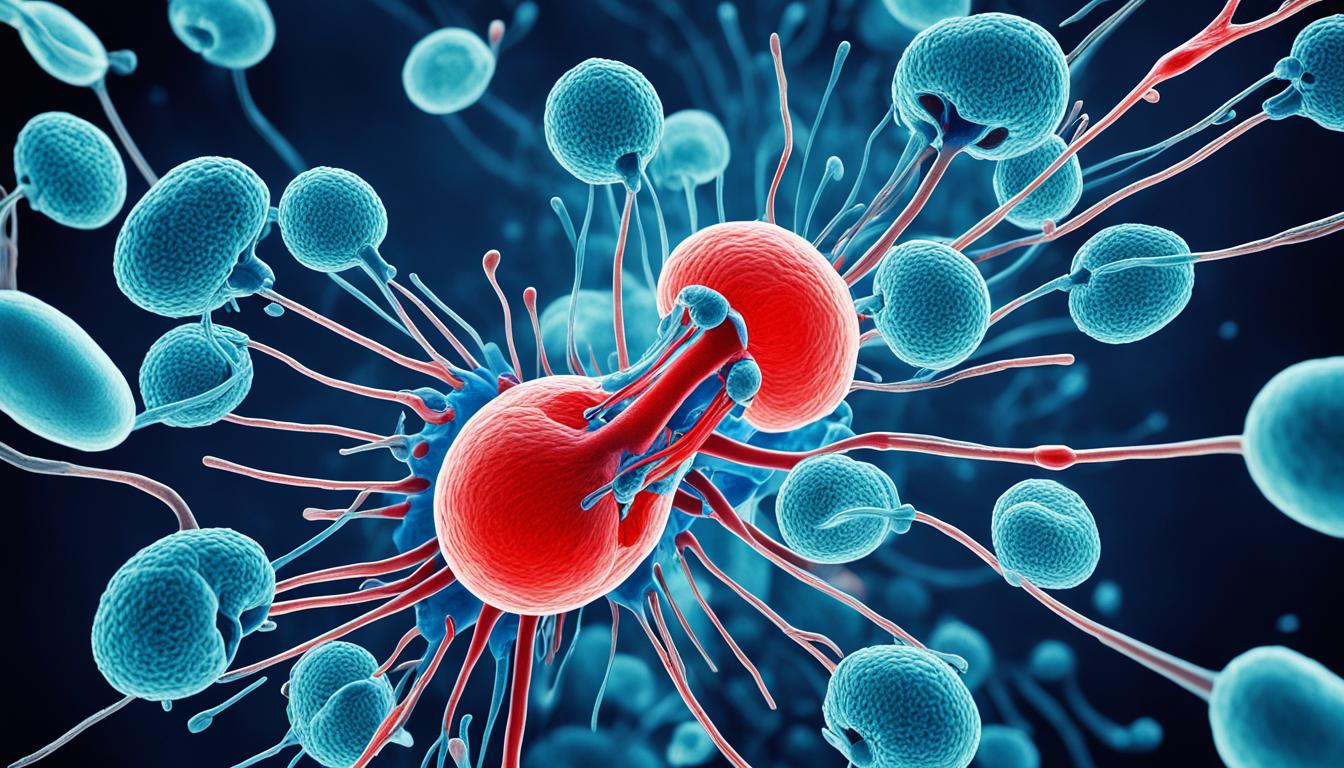Hemolytic uremic syndrome (HUS) is a severe condition. It damages small blood vessels, causing widespread clotting. This can harm the kidneys and other organs. In severe cases, it leads to life-threatening kidney failure. HUS often starts with certain strains of Escherichia coli (E. coli) bacteria, especially affecting young children. Other triggers can be infections, specific drugs, and genetic changes.
The signs of HUS vary but commonly include bloody diarrhea and stomach pain. You might also experience fever, vomiting, anemia, and easy bruising. Other symptoms are decreased urine, swelling, confusion, and high blood pressure. Getting the right treatment quickly is key to overcoming HUS’s serious effects.
Doctors choose treatment based on how severe HUS is. Options often involve replacing fluids and minerals. They might give transfusions to deal with anemia and help clotting. Medications for lowering blood pressure and protecting the kidneys are also used. In severe cases, a kidney transplant might be necessary.
Key Takeaways:
- HUS is a condition characterized by damage and inflammation of small blood vessels, leading to clots in the body.
- The most common cause of HUS is infection with certain strains of E. coli bacteria, particularly in young children.
- HUS can also be caused by other infections, certain medications, and certain gene changes.
- Symptoms of HUS can include bloody diarrhea, stomach pain, fever, anemia, easy bruising, swelling, confusion, and high blood pressure.
- Prompt and appropriate treatment is crucial for a full recovery.
Symptoms and Causes of Hemolytic Uremic Syndrome (HUS)
Hemolytic uremic syndrome (HUS) happens when you get infected with certain E. coli bacteria. This infection mostly affects young children. At first, symptoms may include diarrhea, stomach pain, fever, and vomiting. If not treated, HUS can lead to more serious issues.
As HUS gets worse, it affects your blood and kidneys. This can lead to anemia, blood clots, and kidney damage. You might see more symptoms like bruising, less urine, and swollen legs or feet. Confusion, high blood pressure, and seizures could happen. In the worst cases, HUS could cause a stroke.
E. coli isn’t the only thing that can cause HUS. Other infections, certain drugs, and gene changes can lead to it too. So, knowing the symptoms of HUS is vital. This can help you get early medical help and the right treatment.
Symptoms of Hemolytic Uremic Syndrome (HUS)
| Symptoms |
|---|
| Diarrhea |
| Stomach pain |
| Fever |
| Vomiting |
| Anemia |
| Bruising |
| Decreased urine output |
| Swelling (legs, feet, or ankles) |
| Confusion |
| High blood pressure |
Diagnosis and Treatment of Hemolytic Uremic Syndrome (HUS)
To diagnose hemolytic uremic syndrome, a doctor does a physical exam and lab tests. They look for signs like anemia, high blood pressure, and kidney problems. These checks help figure out if the patient has HUS.
Doctors use blood and urine tests to confirm HUS. These tests show how the body is doing, like if the kidneys are working right. They also check if there’s an infection.
If HUS might be from E. coli, doctors will need a stool sample. This lets them see if E. coli or other bad germs are involved. Knowing the exact type of E. coli can help with treatment.
Treatment Options for HUS
When someone has HUS, they usually need to stay in the hospital. This is to get quick care and avoid more problems. The goal is to treat the cause, manage symptoms, and protect the organs.
Treating with IV fluids is common. This helps the kidneys work better and stops the body from drying out. It’s very important to fix these things fast.
Sometimes, the patient will get blood or platelet transfusions. This can help with anemia or blood clotting problems. It makes the patient feel better by fighting tiredness and weak spots.
Doctors might also give medicine for high blood pressure. It keeps the kidneys from getting worse. Managing blood pressure helps the kidneys stay healthy.
If HUS is very severe, special treatments like plasma exchange might be needed. This can help make symptoms better and help the kidneys work right. It takes out bad things from the blood and puts in good things.
Dialysis could be necessary for very poorly functioning kidneys. It acts like the kidneys to clean the blood. This is vital for balancing electrolytes and removing toxins.
For some patients who have really damaged kidneys, they might need a kidney transplant. This is surgery to replace a bad kidney with a healthy one. A transplant is the best option for a patient’s long-term health.
Stem Cell Therapy Potential for Hemolytic Uremic Syndrome (HUS)
Scientists are looking into using stem cell therapy for hemolytic uremic syndrome (HUS). They believe stem cells can turn into different types of cells. This could help fix blood vessel damage and boost kidney function in HUS patients. But, more research is needed before it becomes a common treatment for this disease.
HUS is hard to deal with and can cause kidney failure and more. Right now, doctors treat its symptoms and offer support. But using stem cells to heal the body from within is a very new and hopeful idea.
There still need to be tests to see if stem cell therapy is safe and really works for HUS patients. These trials will also show if there are negative effects to worry about. If it turns out to be as good as researchers hope, using stem cells could change how HUS is treated, offering new hope for those with this disease.

